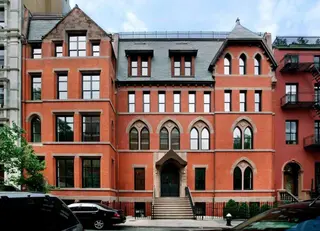 Carter Horsley
Carter HorsleyDec 07, 2012
Carter's Review
This handsome, red-brick, 5-story former chapel at 233 East 17th Street across from Stuyvesant Square was converted to 13 condominium apartments in 2006 by Vesta Development and is known as Landmark 17.
Bottom Line
This building has unusual apartments with high ceilings and wood-burning fireplaces across from one of the city’s finest small parks.
Stuyvesant Square is similar in size and quality to nearby Gramercy Park and it is also convenient to the Flatiron District and Greenwich Village. The property is just to the north of St. George’s Church, which used to be patronized by J. P. Morgan, the financier.
Description
The building has a 10-step stoop with a short canopy and several of the windows on the first and second floors have windowless arched tops. The building has a two-story-high chapel, sidewalk landscaping, high ceilings and protruding air conditioners.
Amenities
The building has a doorman, a roof deck, a billiard room, a garden and a storage room.
In their book, “The A. I. A. Guide to New York City Architecture, Fourth Edition” (Three Rivers Press, 2000), Elliot Willensky and Norval White described the building, which is in the Stuyvesant Square Historic District, as “picturesque, asymmetrical Victorian gothic.”
Apartments
Eight of the apartments have private gardens and terraces and the building’s former chapel was converted into a four-story apartment with 23-foot-high ceilings.
Apartments have high ceilings, fireplaces and washers and dryers. Kitchens have Sub-Zero refrigerators, Viking stoves, wine coolers, Poggenpohl appliances and marble countertops.
Baths have double vanities and radiant heating.
One of the penthouses has a lap pool and the other two have hot tubs.
A three-bedroom apartment has a great room with an open kitchen with an island and a large roof terrace.
A two-bedroom unit has a 25-foot-long living room with an open kitchen.
A four-level apartment with two bedrooms has a garden, a lower level, a small terrace and a double-height great room with a balcony,
History
Originally, it was the St. John the Baptist House and eventually it was taken over by the Salvation Army and the Hazelden Foundation, the famous Minnesota rehab.
The building had been acquired from the Hazelden Foundation, a non-profit organization dedicated to assisting people with alcohol and drug addictions.
The east part of the building was erected in 1877 and designed by Emlen T. Little, and the west part of the building was built in 1883 and designed by Charles C. Haight.

- Condo built in 1877
- Converted in 2005
- Located in Gramercy Park
- 13 total apartments 13 total apartments
- 10 recent sales ($2.3M to $5.3M)
- Doorman
- Pets Allowed
 6sqft delivers the latest on real estate, architecture, and design, straight from New York City.
6sqft delivers the latest on real estate, architecture, and design, straight from New York City.
